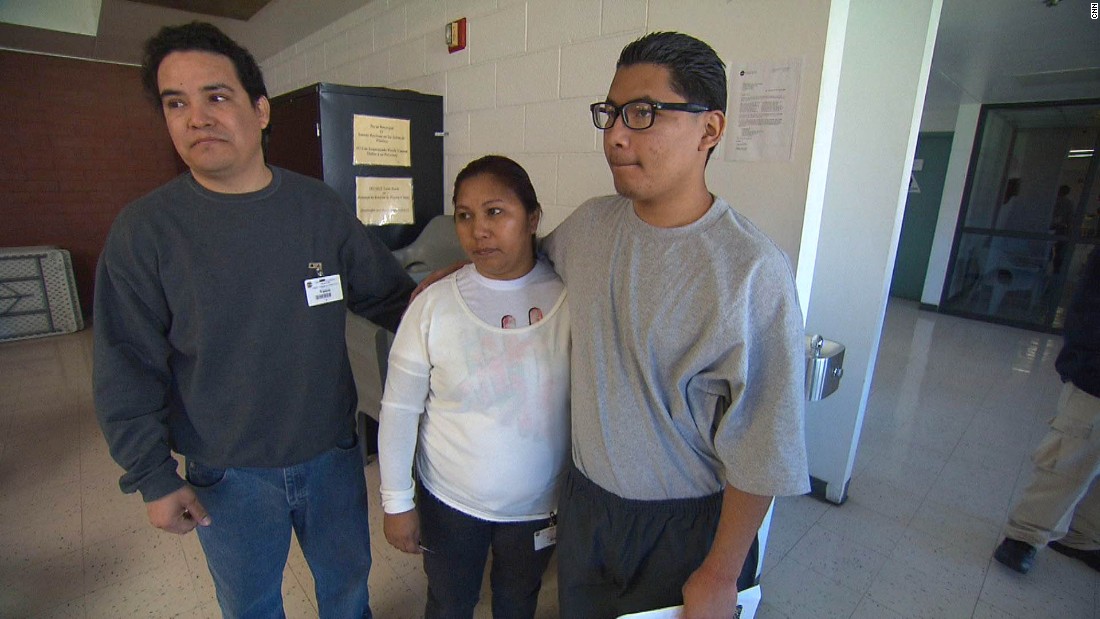
Los Angeles – Convicted juvenile Carlos Adrian Vazquez Jr. lost the will to live at age 16 as he began serving an 11-year sentence for involuntary manslaughter.
Then he wrote a letter to Pope Francis.
“I asked for forgiveness for what I did,” Vazquez told CNN en Español in an interview inside juvenile jail.
To his surprise, the Pontiff wrote back.
“Dear Carlos,” the Pope wrote, “May the peace of Jesus Christ be with you! I was pleased to receive your recent letter. …”
The youth was stunned. “I couldn’t believe it. I didn’t think the Pope would write to someone who’s behind bars,” said Vazquez, now 18.
The Pope’s letter continued. He spoke of “a Holy Door to Mercy” being opened at the juvenile jail, in a ceremony led by the Los Angeles archbishop.
“I pray that as you and your fellow residents celebrate the opening of the Holy Door, you may receive these gifts and be filled with peace and hope,” the Pope wrote. “Know that the Holy Father is thinking of you and praying for you. And please remember to pray for me, because I greatly need your prayers.”
Seeking forgiveness
The exchange of letters is the latest example of the Pope’s new mission of mercy. He has been reaching out to juvenile and adult inmates as part of his Jubilee of Mercy this year.
Francis also demonstrated such compassion with inmates during his recent trip to Mexico, where one prisoner in Ciudad Juarez gave him a wooden carving of the crucifixion.
In 2013, Francis also washed the feet of prisoners, including women, in Rome and urged worshipers “to take the first steps towards … those who are farthest from us, those who are forgotten, those who need understanding, consolation and assistance.”
Deeply touched by the Pope’s January 21 letter, Vazquez no longer wants to end his life, he says.
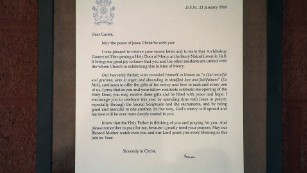
“It gave me a lot of hope knowing that there are people like the Pope who still have not given up on us. I know I’ve made mistakes and have hurt people, but what I learned in my two years and five months I’ve been imprisoned, I didn’t know I was hurting people and that I was hurting myself, too,” Vazquez said.
He expressed regret for his crime.
“Yes, because of the people I hurt, but I have to fall to learn how to get up,” he said.
He also wrote a letter to the slain victim’s family.
“I ask them to forgive me and told them no words would ever give them back the life I destroyed, but I hope one day they can forgive me for my actions and now I just ask for forgiveness and I want to live the life that my victim didn’t have a chance to live and be good,” he said.
Words instead of fists
Vazquez’s imprisonment will be a long one, and it will soon take a more serious turn — “it frightens me because it’s a new experience,” he says — as he prepares for transfer to the men’s Ironwood State Prison in Blythe, California. This week, he was temporarily placed in a men’s prison in Chino, where he is being processed for placement in Ironwood
But he now has the strength to continue paying his debt to society.
“If society does not forgive me, I know God forgives me for my sins,” he said.
He’s learned many lessons.
“The way I thought was to fight every month. Now I use my words instead of my hands,” he said.
His problems escalated when he dropped out of school at age 15. He joined a gang.
“I wouldn’t go home for days, a week, and I lost all connection with my family,” he said.
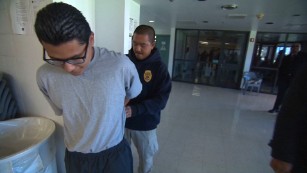
It got worse.
He’s too embarrassed to discuss the details of his crime other than to say, “It was a gang fight and someone died. I wasn’t the one who did it, but because I was there I was charged with the same crime.”
Parents’ anguish
His parents remember the day as if it were yesterday.
“It was a Saturday, and we were heading home,” recalled his father, Carlos. “We received a call from the police letting us know that our son had been arrested and was being accused of murder.”
Talking about that day still pains him and his wife, Adriana Garcia, who have visited their son every Sunday since his incarceration.
“It’s been a difficult experience, very hard for me and my family and my other children,” he said recently while visiting his son in the juvenile detention facility. “In some way, you could say I feel guilty because I didn’t hear his cry for help, and we didn’t understand at that time that he was asking for help.”
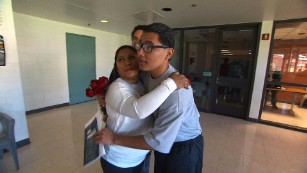
Their son pleaded guilty to a reduced charge of involuntary manslaughter and became an inmate at the Barry J. Nidorf Juvenile Hall in Sylmar, 27 miles northwest of downtown Los Angeles.
Later, he and several of the other convicted juveniles met the Rev. Michael Kennedy, who provides hope to California youngsters serving sentences for life or other long terms.
A Jesuit connection serving youths in trouble
Kennedy, who is a Jesuit priest like Pope Francis, leads the Jesuit Restorative Justice Initiative. He was once pastor at Dolores Mission Church in Los Angeles, the same parish where the renowned Gregory Boyle had earlier served as pastor. Boyle, also a Jesuit, is a national figure helping former gang members from East Los Angeles rebuild their lives with jobs.
Under Kennedy’s guidance, Vazquez and the other youths wrote letters to the Pope.
Kennedy recalled Vazquez as “muy loco,” or “very crazy,” when he first arrived in the juvenile facility, he told CNN en Español.
“He would get into fights here. He had nine fights at one time in a short period of time, and all he would think about was his gang,” Kennedy said.
The youth changed after he received his prison sentence a year and nine months into his initial incarceration.
His parents’ weekly visits make him feel as if his parents are also serving the sentence with him, the son said.
With help from family and volunteers, the boy became a young man, the priest said.
“It’s easy to say you’ve changed, but the change is in the actions of someone,” Kennedy said. “He started to read a lot of articles about the Pope, and he felt he was a person who had transformed his own self, and he knew that the Pope had a special place in his heart for the inmates, prisoners.”
The Vatican took notice of the letters.
Vazquez wrote:
“If only the world were filled with more love, compassion, forgiveness and mercy. Being an outcast of society, I want the world to see us for who we truly are; human beings, who make mistakes like everybody else. But we are able to rise again like a Phoenix,” the youth wrote the Pope. “I will become a leader some day, like Cesar Chavez, Martin Luther King Jr., Nelson Mandela and Malala Yousafzai. Thank you for your loving and your merciful example to all of us.”
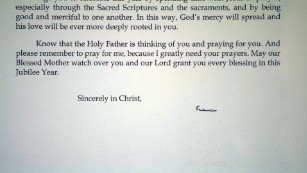
The Vatican also published other letters on its website that were written by incarcerated juveniles in 2013, including this one:
“Dear Pope Francis, I have never been to Rome. I do not know if it is near Los Angeles because all my youth I have only known my neighborhood. I hope one day I will be given a second chance and receive a blessing from you and maybe even have my feet washed on Holy Thursday.”
But it was Vazquez’s letter to which the Pope took time to reply.
It was enough to turn around Vazquez’s life — albeit in prison.
“It gives me a lot of pride because it’s a message from God, that we are all humans, and he gives us hope that God wants all of us to be equal and we all commit mistakes, and we can get up and continue,” the young man said.
He originally wrote the Pope to receive a blessing.
He discovered a whole lot more: He now wants others to see him as an example of second chances.
As reported by CNN
